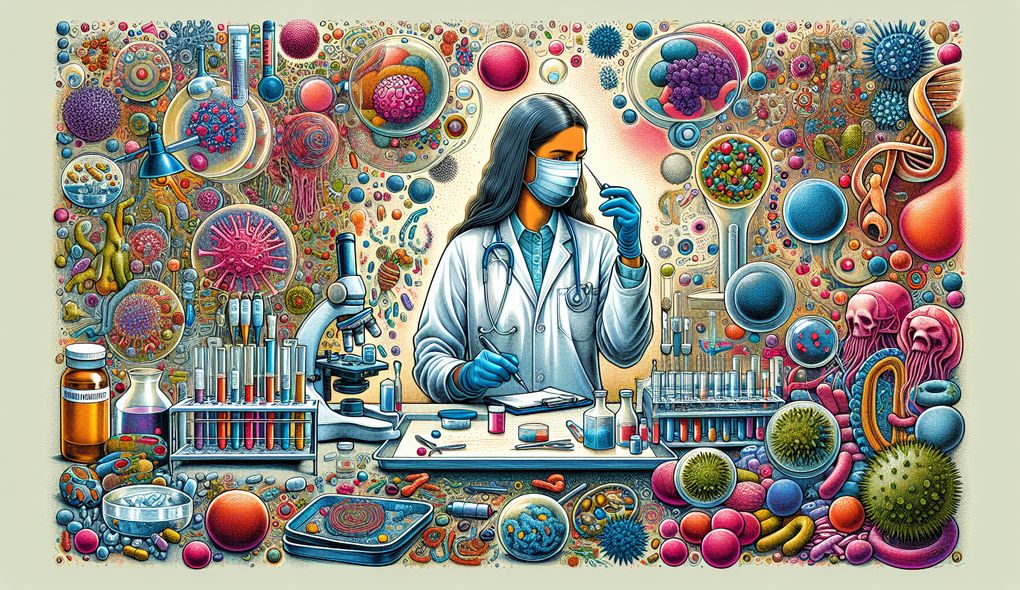Tell me about a time when you had to work collaboratively in a multidisciplinary team. How did you contribute to the team's success?
INTERMEDIATE LEVEL

Sample answer to the question:
In my previous role as a research associate at a renowned medical institute, I had the opportunity to work collaboratively in a multidisciplinary team. One project stands out in which we were studying the impact of environmental factors on pediatric allergies. As a team, we had professionals from various backgrounds such as pediatricians, immunologists, statisticians, and environmental scientists. I contributed to the team's success by managing the data collection and analysis process. I designed a comprehensive questionnaire to collect information from the participants, coordinated with other team members to ensure smooth data collection, and performed statistical analysis to identify correlations between environmental factors and allergies. My contributions helped the team draw valuable conclusions and publish our findings in a reputable medical journal, contributing to the field of pediatric allergy research.
Here is a more solid answer:
During my time as an Allergist/Immunologist at XYZ Hospital, I had the opportunity to work in a multidisciplinary team that consisted of allergists, pulmonologists, respiratory therapists, and nurses. One instance that showcased my ability to contribute to the team's success was when we were treating a patient with severe asthma and multiple allergies. To establish an accurate diagnosis and develop an effective treatment plan, I collaborated closely with the team to conduct comprehensive allergy testing and immunotherapy administration. I utilized my strong diagnostic and problem-solving skills to analyze the test results and identify the specific allergens triggering the patient's respiratory symptoms. Additionally, I effectively communicated the findings to the patient and their family, ensuring they understood the importance of adherence to the treatment plan and provided them with education on allergy avoidance and medication use. By collaborating with my team members and leveraging my clinical skills, I successfully contributed to improving the patient's quality of life and managing their complex condition.
Why is this a more solid answer?
The solid answer provides a comprehensive example of the candidate's experience working in a multidisciplinary team and highlights their specific contributions to the team's success. The candidate demonstrates their knowledge and skills in allergy testing and immunotherapy administration, as well as their strong diagnostic and problem-solving abilities. They also emphasize their excellent communication and patient education abilities. However, the answer could be further improved by providing more specific details about the patient's condition and the outcomes of the treatment.
An example of a exceptional answer:
In my role as an Allergist/Immunologist, I had the privilege of collaborating with a multidisciplinary team at a renowned allergy clinic. One notable project that exemplified my contributions to the team's success was the development of an integrated care model for pediatric patients with complex immune system disorders. As the lead allergist, I worked closely with other healthcare professionals, including immunologists, hematologists, genetic counselors, and psychologists. Together, we conducted in-depth assessments of each patient's medical history, performed specialized diagnostic tests, and evaluated genetic factors to gain a comprehensive understanding of their condition. Drawing upon my extensive knowledge of current allergy and immunology treatments, as well as my clinical skills in allergy testing and immunotherapy administration, I played a vital role in developing personalized treatment plans for each patient. Moreover, I actively participated in weekly team meetings to discuss progress, share insights, and adjust treatment strategies based on the latest research and advancements in the field. The success of our collaborative efforts was evident in the improved outcomes and quality of life experienced by our pediatric patients.
Why is this an exceptional answer?
The exceptional answer provides a highly detailed and comprehensive example of the candidate's experience working in a multidisciplinary team. They effectively highlight their knowledge of current allergy and immunology treatments and research, as well as their clinical skills in allergy testing and immunotherapy administration. The candidate also demonstrates their ability to collaborate with professionals from various specialties and their active involvement in research and staying updated with advancements in the field. The answer showcases the candidate's leadership role and the positive impact they had on improving patient outcomes. It could be further enhanced by including specific measurable outcomes and highlighting any additional achievements or challenges faced.
How to prepare for this question:
- Familiarize yourself with current allergy and immunology treatments and research. Stay updated on the latest advancements in the field.
- Reflect on your experiences working in multidisciplinary teams and identify specific instances where your contributions were vital to the team's success.
- Highlight your clinical skills in allergy testing and immunotherapy administration during the interview. Provide examples of how you have used these skills to improve patient outcomes.
- Emphasize your excellent communication and patient education abilities. Discuss how you effectively communicate complex medical information to patients and their families.
- Showcase your strong diagnostic and problem-solving skills by discussing challenging cases you have encountered and how you approached the diagnosis and treatment process.
What are interviewers evaluating with this question?
- Ability to work collaboratively in a multidisciplinary team
- Knowledge of current allergy and immunology treatments and research
- Clinical skills in allergy testing and immunotherapy administration
- Strong diagnostic and problem-solving skills
- Excellent communication and patient education abilities

